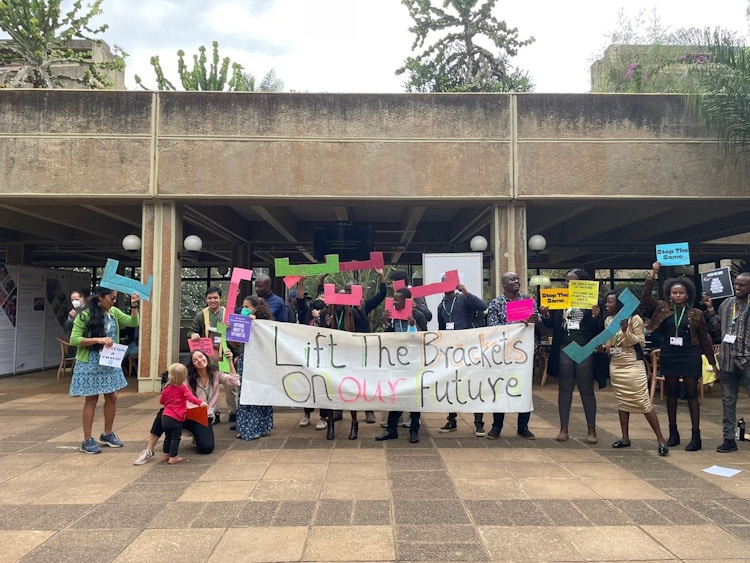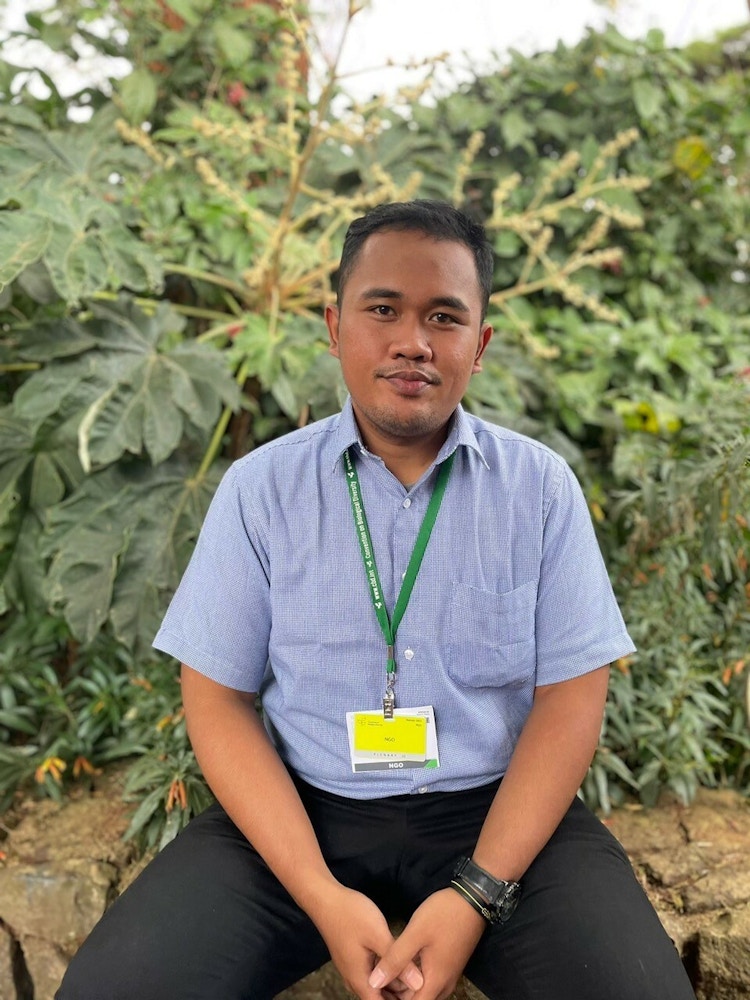Nairobi Biodiversity Negotiations
Slow and Unambitious Nature Talks in Stark Contrast to the Urgency of its Purpose
Whilst forests are being cut, ecosystems destroyed and biodiversity
is decreasing at an alarming rate, the long awaited UN agreement to
protect nature is progressing at a snail’s pace.

EXASPERATED: Delegates in Nairobi are exasperated with the bracket in the draft text, meaning that there is no consensus on many key issues like Indigenous peoples rights and funding. Photo: Private
Nairobi/Oslo
This week, government officials from 195 countries and representatives from civil society and Indigenous peoples met in Nairobi, Kenya, for the fourth open-ended working group meeting to discuss the draft text of the new Global Biodiversity Framework.
The framework, which has been named 'The Paris Agreement for Nature’, outlines specific targets and implementation practices that aim to reduce global loss of biodiversty and create a 2050 road map for ‘living in harmony with nature’.
As the negotiations drew to a close on overtime Sunday evening, the atmosphere was far from harmonious: “We are disappointed, frustrated and exhausted. After a week in Nairobi, we have not advanced much from the Geneva talks a few months ago. We are wasting time at a moment when action is urgent, key species are dying and resources are becoming increasingly scarce,” says Toerris Jaeger, Secretary General of Rainforest Foundation Norway.

CRITICALLY ENDANGERED: The cotton-top tamarin (Saguinus oedipus) is one of the rarest primates in the world. Only an estimated 6000 are left in the Colombian rainforest due to large-scale destruction of their habitat. Photo: Thomas Marent
Resource mobilisation and area-based conservation
One
of the sticking points is resource mobilisation and commitment by
countries to stop ecosystem exploitation, such as deforestation and
forest degradation. “Countries must own up to their global
responsibilities to protect rainforests and other biodiversity rich
ecosystems. While at the same time, developed countries must realise
their role and commit to greatly increase international funding for
biodiversity protection,” says Jaeger.
Another point of discussion is area-based conservation and the protection of key bioregions, such as the Amazon basin, the Congo basin and the tropical rainforests of South East Asia. “Promoting and protecting key ecosystems, like the world’s large tropical rainforests, must be at the core of this nature agreement. All conservation efforts must respect the rights of Indigenous people and recognise the key role they play in managing these forest. The framework should therefore promote Indigenous land tenure in order improve conditions for their forest management and provide greater protection against outside threats,” says Toerris Jaeger.
Threats and killings of environmental defenders have increased over
the past few years and Indigenous People make up a disproportionate part
of these statistics. Their rights are under threat across all
continents.
Wins for women and environmental defenders
Among
the wins in the Nairobi negotiations are the inclusion of gender and
environmental defenders in the text, and their access to justice. There
are some references to Indigenous people and local communities, but in
many places in the text, there is still no consensus to include them.
This is despite the fact that increasing evidence points to higher levels of biodiversity and lower deforestation rates in forests managed by Indigenous people. Only one percent of international climate funds reach Indigenous people, according to Rainforest Foundation Norway’s report Falling Short.

Ogy Dwi Aulia, Project Manager at Forest Watch Indonesia. Photo: Private
Unified demands across the tropics
From
Indonesia to the Congo basin and the Amazon, similar demands are voiced
at grassroot level. These demands include land tenure, inclusion and
access to funds for Indigenous people and local communities.
“Tropical rainforests are the most important ecosytems for protecting biodiversity, and many of these forests are already sustainably managed by Indigenous people. It is therefore important to secure the rights to traditional territories and recognise the traditional conservation efforts by these communities. Indigenous people must be involved at all levels of the adoption and implementation of the global biodiversity framework. Indigenous and local communities must also be given access to funds to reinforce conservation efforts,” says Joseph Itongwa Mukumo, national executive director for ANAPAC in the Democratic Republic of Congo (DRC).
Ogy Dwi Aulia, a project manager at Forest Watch Indonesia has similar demands for the biodiversity framework, exemplified by the situation in his home country: “Indonesia has a tremendous amount of forest, but 55 % is outside protected areas, which means they are very vulnerable to threats. Most of this forest is under Indigenous people’s land, but less than 16 % of Indigenous land is formally recognised by the government. Right now, we are facing a lot of threats.”
Edith Bastidas, an Indigenous representative from Colombia added: “We believe there have been some important advances here in Nairobi, but the process is too slow, contrasting the speed at which we are losing biodiversity. We ask the parties to accelarate the process and take into account the proposals, especially those from Indigenous people related to our territories and our rights. We are the ones who are protecting the most biodiverse areas.”
New date and place for high-level summit
During
the talks in Nairobi, a new date and location was announced for the
high-level nature summit where the final framework is expected to be
adopted. Due to covid-related complications in China, the nature meeting
is now rescheduled from Kunming, China in late August, to Montreal,
Canada 5 - 17 December. China will still formally be the summit host.
Another open-ended working group meeting will take place before the
summit.
For questions, please contact: Kristin Rødland Buick
International communications - Rainforest Foundation Norway
Cellphone: +44 7377675135